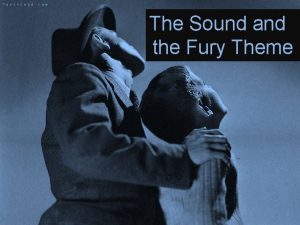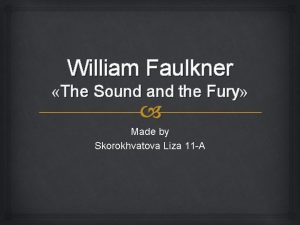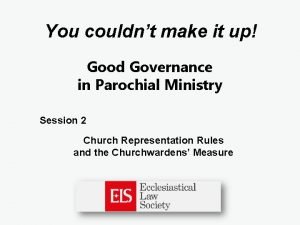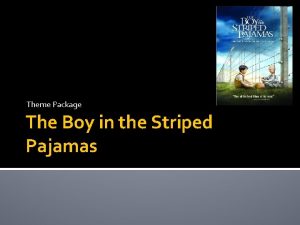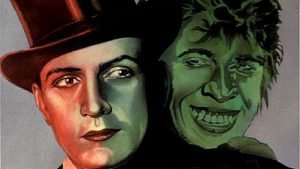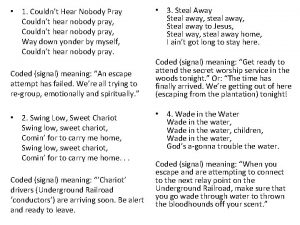Important Quotations in Sound and Fury I couldnt










- Slides: 10

Important Quotations in Sound and Fury

I couldn't feel the gate at all, but I could smell the bright cold. (1. 31) Thought: Benjy, who is unable to communicate with other people, conveys his impressions of his surroundings through his sense of smell. He "smells" his knowledge, like his knowledge of the cold weather.

Caddy smelled like trees and like when she says we were asleep. (1. 38) Benjy remarks several times throughout his section that Caddy smells like trees or leaves. Caddy is Benjy’s only mother figure and source of affection when he is young, and she provides the cornerstone of comfort and order in Benjy’s mind. Benjy has relied heavily on his sister, and her absence plunges him into chaos. In his earliest memories of Caddy, Benjy pleasantly associates her youthful innocence with the smell of the trees in which they used to play.

Caddy knows Benjy is upset and begins to avoid him. Benjy laments this new distance between himself and his sister by saying that Caddy suddenly does not smell like trees. Trees are a pleasant memory associated with the affection and repose that Caddy has brought to Benjy’s life, and when that order disappears, Benjy ceases to associate Caddy with that memory

I saw them. Then I saw Caddy, with flowers in. . . her hair, and a long veil like shining wind. Caddy (1. 503) Thought: Benjy’s refrain, "Caddy" is the heart of the book. That fact that he’s able to get to the heart of his unhappiness and loneliness means that, in many ways, he’s more with it than either of his brothers.

“If I’d just had a mother so I could say Mother” This quotation occurs several times toward the end of Quentin’s section. Quentin is reflecting on how little affection his mother gave him as a child. Consumed by self-absorption and insecurities about her family name, Mrs. Compson showed affection for only one of her children, Jason.

Quentin and Caddy formed a close bond as neglected, unloved outsiders, and Quentin developed an inordinately strong attachment to his sister. This bond leads to Quentin’s despair over Caddy’s promiscuity, which ends with his suicide. The object of Quentin’s focus during the last hours of his life—his mother’s absence and neglect—shows how significant and damaging Mrs. Compson’s failure as a mother has been.

I seed de beginnin, en now I sees de endin. Dilsey says these words during the Easter church service in the final section of the novel, just after she learns that Miss Quentin has left. Dilsey’s comment reveals her insight into the Compson family tragedy and her ability to see it in the context of a greater cycle. Dilsey has been present since the beginning, when the Compson children were only babies, and she is still here at the end, the culmination of the family’s disintegration. In this sense, Dilsey represents a constant in the novel. She has maintained the pure Southern values of faith, love, and family that the Compsons have long abandoned.

Dilsey endures the test of time, surviving because • she has conviction and faith in her own vision of eternity that is completely free of worldliness or petty human concerns. Dilsey has no preoccupation with time because she has faith in a spiritual eternity, which enables her to see the tragedies of the Compson family with perspective and distance. Her acceptance of the passage of time makes her a calming and comforting presence. Dilsey accepts that she, like the Compson family, has a beginning and an end. She uses the time she is given to do as much good as she can, rather than wasting it on obsessions with the past.

